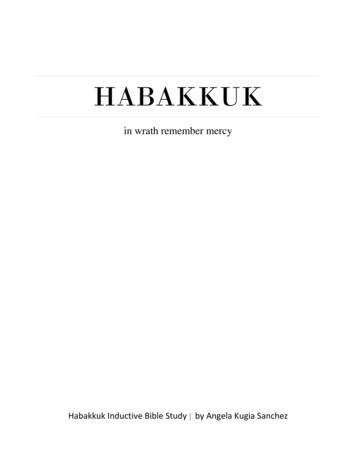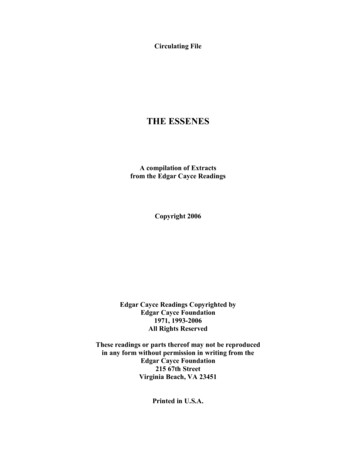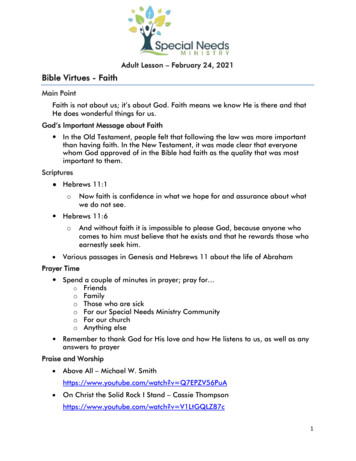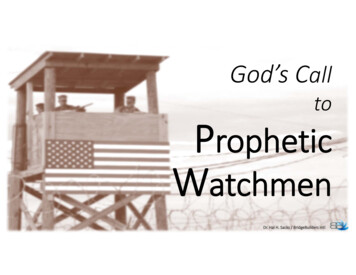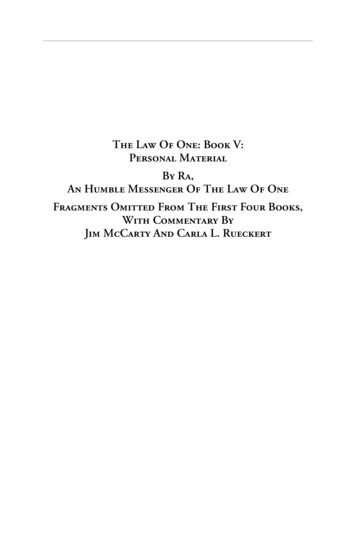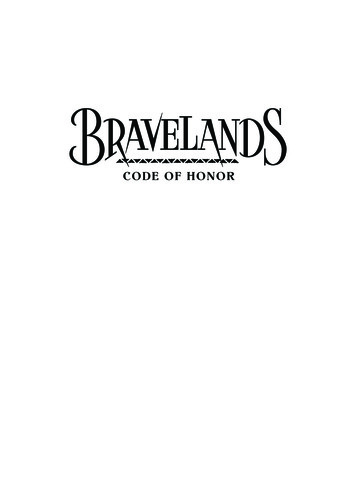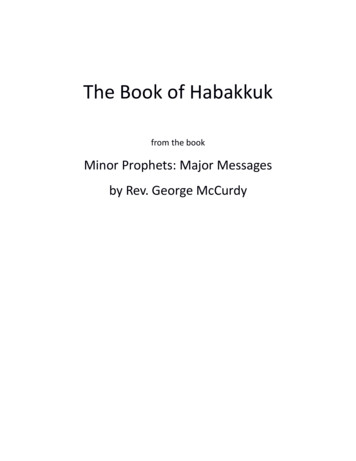
Transcription
The Book of Habakkukfrom the bookMinor Prophets: Major Messagesby Rev. George McCurdy
ContentsHow To Use This Study Guide. 4Introduction. 5What do we know about Habakkuk?. 6Chapter One. 8Habakkuk 1:1-5. 8Habakkuk 1:12-17. 24Chapter Two. 32Habakkuk 2:1-3. 32Habakkuk 2:4-5. 36Habakkuk 2:6-7. 39Habakkuk 2:8. 44Habakkuk 2:9-10. 47Habakkuk 2:11. 49Habakkuk 2:12-13. 53Habakkuk 2:14. 56Habakkuk 2:15-17. 59Habakkuk 2:18-20. 64Chapter Three. 69Habakkuk 3:1-4. 69Habakkuk 3:8-9. 79Habakkuk 3:10-15. 83Habakkuk 3:16-17. 912
Habakkuk 3:18-19. 97Epilogue: A Summary of the Book of Habakkuk.102Chapter One. 102Chapter Two. 102Chapter Three. 1033
How To Use This Study Guide1. A slow unhurried reading of Habakkuk is essential. Reading the chapter beforelooking at the notes, while working with the notes, and after finishing with thenotes will give each researcher a powerful sense of the series of meanings withineach chapter. It is important to be comfortable with all the names and places inthe prophecy and to understand the announcements the prophet makes onbehalf of the Lord. When possible, historical information will be included in thenotes to increase reading comprehension and enhance application.2. Our study of each chapter of Habakkuk will begin with quotes from a work of theWritings called Summary Exposition of the Prophets and Psalms. This workincludes a verse-by-verse overview of all three chapters of Habakkuk thatprovides general information about the internal sense. Our research will helpmove us from the generals to the particulars of the internal sense.3. Another important reference tool is Searle’s General Index to Swedenborg’sScripture Quotations. This reference is used to find passages in the Writingswhere a verse(s) from the Word is either explained specifically or used toillustrate a doctrinal point that we can use in our study. There is also another useof this work. As we study, each researcher will be led by the Lord’s Providence inmyriad ways, according to specific needs or states. Knowing how to use this bookwill help each of us to explore relevant topics and look up related passages toincrease our knowledge of the three-fold Word.4. You will soon discover that not every verse, word, name, etc. is directly quoted inthe Writings. But there are often other references to the same name, place, orthing in the explanation of a different verse of the Word. The hope is thatreflection on these other doctrinal explanations will help us see possibleapplications to our study of Habakkuk. We will need to use “derived doctrine”often. Please don’t run away from this maligned term. If we use it properly andadmit openly that it is derived doctrine, we bring no harm to the internal sense.5. Keep some kind of notebook handy during your study times. Write out insights,questions, and any summaries you find helpful in organizing your thoughts abouteach chapter. The goal of this study guide is not to give a detailed summary of theinternal sense but to start each researcher’s quest for deeper insight.6. At the end of each chapter in the study guide, you will find a study review. Thereview includes a summary of each section to help you reinforce and build onyour understanding of several of the key points.7. Begin each study unit with a devotional prayer asking the Lord to guide anddirect your thoughts. Certainly beginning in this sphere has the power to inspireand open our minds with a higher spiritual priority that will keep us in thecompany of the Lord’s angels. As the Writings teach, we must seek to love truthfor truth’s sake. Such an approach will free each reader from preconceived ideasthat might limit his or her ability to “see” the intent and message of the Lord’sWord.4
IntroductionWhat the Lord said to the disciples was “said to all who are of the church, for thetwelve disciples represented all such ” (Arcana Coelestia [AC] 3354) “‘The twelvedisciples’ signify all who are of the church, and in an abstract sense all things of thechurch, which are truths from good.” (Apocalypse Explained [AE] 851)Why begin this introduction to the book of Habakkuk with these quotes about therepresentation of the disciples? Each disciple represents some aspect of the qualityof the spiritual life within us. The disciples are a complex of our spiritual life. Theircomplex seeks to reach out and touch us at some level of our spiritual development.The states and activities of this development are not static; they are ever changing.So, too, I believe, the prophets form a complex to touch our state. Each prophet westudy has a unique prophetic style and message. The Lord inflows into thatuniqueness and unfolds His plan to overcome the falsification and adulteration ofHis Word, and calms us with the news of the birth of the New Church. What we needto do is listen to the message of each prophet without getting caught up in hispersonage. “Unless the internal sense were to teach what these words signify andunfold within them, the investigators and interpreters of the Word might be ledaway and fall into opinions altogether foreign to the truth; or it might evenhappen that those who at heart deny the holiness of the Word might come to theconclusion that ” (AC 3651, emphasis added)Habakkuk’s prophetic style is one of not talking to the people. He, like Job, asks theLord hard questions. His questions are complaints. Listen to the “woes” headdresses: Injustice is rampant.The righteous are surrounded by the wicked.The law is powerless to stop the wicked.The Lord appears to be allowing evil to go unpunished.With anguish Habakkuk cries out, “How long, O Lord, will I call for help, and You willnot hear?” Habakkuk continues his list of woes: Woe to the proud. (2:4-5)Woe to the greedy. (2:6-8)Woe to the dishonest. (2:9-11)Woe to the violent. (2:12-14)Woe to the sensual. (2:15-17)Woe to the idolater. (2:18-20)The Lord responds to Habakkuk, “Look among the nations and watch—be utterlyastounded! For I will work a work in your days which you would not believethough it were told you.” (Habakkuk 1:5, emphasis added)5
So, like Job, Habakkuk complains, argues, challenges, and questions the Lord’smethods of bringing order to the church. But in the end, Habakkuk comes full circle,confidently praising the Lord’s providence and looking forward to the establishmentof the New Church.Is there some part of our spiritual life in which we can identify with Habakkuk’sargumentative approach to the Lord? When we read, watch, and see things going onin the world, don’t we want to cry out, “How long, Lord, will it be before you dosomething with this world of ours? Our laws are being made a mockery. Ourpoliticians are misusing their offices for personal gain. Political correctness ispulling down the Ten Commandments from buildings. Displaying creè che scenes isbeing found unacceptable and offensive. Murders, pillage, and attacks areperpetrated with minor penalties.”Habakkuk’s name means “to embrace” or “to wrestle.” He seems to be representativeof our worrisome feelings. He wants to talk with the Lord and not the people. Isn’tHabakkuk’s style a great example for us? We need to talk more with the Lord andhave less concern about public opinion.Let’s pause again with the Lord’s answer to Habakkuk’s doubting state. Watch. Like a watchman on a tower, we are to be alert and look intently foranswers from the internal sense of the Word.Be utterly astounded. Can we ask ourselves a question? Are we in a state ofanticipation? Or are we in a spiritual rut going around in circles with littlehope or belief in the reality of the New Church? Can we be astounded, or arewe somewhat jaded in our philosophy of life?I will work a work in your days which you would not believe though itwere told you. I don’t know about you, but these words fire me up to believethe Lord. I want to come into a state that will open my eyes to see things thatthe doubter and nay-sayer will never see or believe. May the Lord help uslearn truth through the continuous degree so that we will be found worthy tohave the Lord lift us to the see the beauty and enlightenment of discretedegrees.WHAT DO WE KNOW ABOUT HABAKKUK?We know almost nothing about Habakkuk’s life. He gives us no clue to his parentage.No home village is mentioned. Was he from the northern or southern kingdom? Hegives us no clue about his work. We don’t know who was reigning over Israel duringhis lifetime. The only clue historians note is in Habakkuk 1:6, where the Lord says: “Iam raising up the Chaldeans.” The Chaldeans are the Babylonians. On the basis ofthis reference, historians offer an approximate date of 620 B.C.Once again, we need to ask the question, “Why does the Word of the Lord give solittle information about the prophet?” The answer comes back each time that the6
Lord wants us to study His Word apart from the person conveying it to us. “Unlessthe internal sense were to teach the investigators and interpreters of the Wordmight be led away and fall into opinions altogether foreign to the truth ” (AC 3651).What the Lord does for our salvation is by far more important than backgroundinformation about Habakkuk’s life.With this teaching as our beacon, may the Lord guide and direct our study ofHabakkuk. We pray that He will hear our concerns and that He will speak thosewonderful words of advice to us: Watch. Be astounded. You are about to beastonished by My work of salvation; even if you have doubts and fail to see it all, theLord’s New Church will come to fruition. SELAH!7
Chapter OneHABAKKUK 1:1-5“The burden [oracle] which the prophet Habakkuk saw.O Lord, how long shall I cry, and You will not hear? Even cry out to You, ‘Violence!’ andYou will not save. Why do You show me iniquity, and cause me to see trouble? Forplundering and violence are before me; there is strife, and contention arises. Thereforethe law is powerless, and justice never goes forth. For the wicked surround therighteous; therefore perverse judgment proceeds. Look among the nations and watch—be utterly astounded! For I will work a work in your days which you would notbelieve, though it were told you.”Passages From The WritingsProphets and Psalms (P&P) “Justice and truth perish. Grief on the part of the Lord, and directed to theLord.”Coronis 56 “From all these passages [Habakkuk 1:3 being one of them] it may be seenwhat ‘vastation’ and ‘desolation’ are; and that it is not a vastation anddesolation of the peoples of a land, and of cities, but of the goods and truthsof the church, whence there is nothing but evils and falsities.”Derived Doctrine“The burden [oracle] which the prophet Habakkuk saw.” AE 208 [7] explains what is meant by to “bring in no burden through the gatesof this city.” It means to “not admit [permit] that which is from man’s own[proprium], but that which is from the Lord.”AC 9254 explains that “‘burden’ signifies falsity not agreeing with the good ofthe church by reason of which they were about to perish.”AE 172 explains that “burden” is a person’s proprium, “which is to love selfabove God and the world above heaven, [and which] offers resistance.”Apocalypse Revealed (AR) 144 explains that “burden” means or represents“what they should be aware of.”To understand the word “oracle,” as it is used in some passages of the Word,we must refer to a description of Solomon’s temple and the word “adytum.”8
The adytum, or oracle, was the place where the ark was, and it represented“where the Lord is” as to His Divine Truth. (AE 638 [8] and 700 [39])“ which the prophet Habakkuk saw.” AC 7268 defines what a “prophet” of the Lord does. A prophet is “one whoutters in a form adapted to the understanding the Divine truth whichproceeds immediately from the Lord, and which transcends allunderstanding a ‘prophet’ also denotes the doctrine of the church ”The name “Habakkuk” means to “embrace” or “ardent embrace.” Does thename “Habakkuk” have anything to do with the spiritual message? There areno references in the Writings that say what “Habakkuk” signifies orrepresents or denotes.AC 937 has a wonderful explanation of the Word and what the Lord “sees.”The Word has such great arcana as to be “inexhaustible even as to the oneten-thousandth part of it the angels—from the Lord—can see, in illimitablevariety, the whole process of regeneration, and the state of the man who is tobe and who has been regenerated, while man can see scarcely anything.” Didthe Lord help the prophet Habakkuk to “see” the illimitable process thepeople needed to experience in regeneration?“O Lord, how long shall I cry, and You will not hear?” What is the prophet expressing here? Impatience, fear, anxiety, confusion, anddoubt? Is Habakkuk questioning the Lord’s providential care and concern forIsrael? After all, hundreds of years had passed since the prophecy of theLord’s advent had been given, and there was no sign of the Messiah yet. Wasthe prophecy of the Messiah a reality? John 10:24 tells of a time when “ theJews surrounded Him and said ‘How long do You keep us in doubt? If Youare the Christ, tell us plainly.’” Revelation 6:9-10 quotes the words of those“under the altar who had been slain for the word of God ” crying “with aloud voice, saying, ‘How long, O Lord, holy and true, until you judge andavenge our blood on those who dwell on the earth?’”AR 327, explaining the meaning of Revelation 6:10, says that this “signifies,why is the Last Judgment delayed and why in justice are they [who doviolence to the Word] not condemned ?”The Lord employed the “How long” question, too. “How long, O sons of men,will you turn my glory to shame? How long will you love worthlessness andseek falsehood?” (Psalm 4:2)“Even cry out to You, ‘Violence!’ And You will not save.” “A ‘voice crying’ and ‘the voice of a cry’ are common forms of expression inthe Word, and are applied to every case where there is noise, tumult, ordisturbance [or] accusation.” (AC 375) To “cry” out to the Lord has a9
“signification of imploration, and also interior lamentation consequently italso denotes supplication from grief.”AE 734 [17] describes “a man of violence” as those who “from a depravedintention” pervert the truths of the Word by “thinking evils in the heart ”“The earth is said to be ‘filled with violence’ because of foulcupidities ‘Corrupt’ is predicated of the things of the understanding whenit is desolated; ‘violence,’ of the things of the will, when vastated. Thus ‘tocorrupt’ is predicated of persuasions; and ‘violence,’ of cupidities.” (AE 734[17], emphasis added)The phrase “You will not save” is an appearance the prophet believed to betrue. However, we know and can cite many passages from the Word that tellus of the Lord’s perpetual care. If the Lord, for the least of moments, were toignore or care less for anyone, it would be all over for that person. (AC 2410)We have to see Habakkuk’s statement for what it is: a moment of finiteinternal anguish in which the prophet sees no hope and is grieved by hisblinded understanding.“Why do You show me iniquity, and cause me to see trouble?” In the positive sense, we can see “the signification of ‘showing,’ when byJehovah, that is the Lord, as being to give perception, and as this is affected bymeans of influx, it denotes to inspire ” (AC 8354) We can surmise that theprophet’s being shown iniquity may represent humanity’s momentary lack ofperception and lack of influx.“Iniquity” comes about when there is a state of lawlessness (wickedness). AC3488 [6] describes for us how iniquity multiplies. When the falsities of faithgrow cold, this denotes “the expiring of charity, for they keep pace together;where faith is not, there charity is not, and where charity is not, faith is not;but charity is that which receives faith, and no charity is that which rejectsfaith; this is the origin of every falsity and every evil.”The prophet speaks of seeing trouble. What does this represent? “Trouble” inthe positive sense “denotes labor because it is predicated of temptations, forin these they who are tempted have labor against falsities and evils, and theangels also have labor with them to keep them in the faith, and thus in thepower of conquering ” (AC 8670) For the hells, “trouble” would seem torepresent their loss of power and the Lord’s conquering victory over evilsand falsities.“For plundering and violence are before me; there is strife, and contention arises.” “Plunder” or “plundering” has a positive and negative meaning. When theWord talks about the Lord “plundering,” it means “the rescue and deliveranceof the good by the Lord.” (AC 6442) “Plundering” by the hells signifies “todestroy the doctrine.” (AC 4503) “ the cupidity of gain and avarice has within10
it the desire not only to possess the whole world but also to plunder and evenkill everyone for the sake of gain.” (AC 4751 [2])“Violence” signifies “offering violence to the good of charity.” (AE 175[10])“Violence” in the “internal sense is bearing hatred against the neighbor.”(AC 1010)“Strife” occurs when the internal and external aspects of a person disagreeabout the ends of worship. “ for when in worship the internal man desires toregard the ends that belong to the kingdom of God, and the external mandesires to regard the ends that belong to the world, there thus arises adisagreement which manifests itself in the worship The smallest bit of suchdisagreement is noticed in heaven This is what is signified by strife ” (AC1571)AC 3425-7 illustrates the nature of “contention.” What a person acknowledgesfor the sake of gain is denied in the external and debated in the internal. Theopposites of the external and internal become involved in “contention.” Notethis teaching in AC 3427: “ ‘contention’ or ‘dispute’ is derived from akindred word which means oppression and injury.”“Therefore the law is powerless and justice never goes forth.” As we turn our attention to the words “law” and “power,” let’s first considerthese words in the positive sense. “ all precepts, indeed the Law and theProphets, are founded on the one Law, to love the Lord above all things andthe neighbor as one’s self ” (AC 1038, emphasis added)If this “one Law” is voided in the will or heart, does it not make sense that“the law is powerless”? If this “one Law” is ignored in the will, does it notmake sense that “justice never goes forth” from the heart? Until the internalperson worships the Lord and leads the external person, law and justice arepowerless forms of the one Law.“For the wicked surround the righteous; therefore perverse judgment proceeds.” Hold fast to the terms “wicked” and “surround” when reading AC 830. “They,who beguile men by subtle deceit, wearing a pleasant face and manner ofspeech, but concealing envenomed guile within, and thus captivating men forthe purpose of ruining them, are in a hell more dreadful than the hells ofothers, even more dreadful than the hell of murderers. They seem tothemselves to live among serpents; and the more pernicious their deceit hasbeen, the more dreadful and venomous and the more numerous the serpentsappear which surround and torment them.” Wickedness hates the Lord andthe neighbor. Wickedness “burns” to destroy the Lord and all those whofollow Him.From the wicked we can expect warped judgment. The wicked cannot thinkclearly. The wicked twist and turn truth to their own ends.11
“Look among the nations and watch—be utterly astounded!” AC 622 has a short, but important, explanation of the meaning of “nation.”“Here, as in other places, ‘nation’ denotes evils which are of the will or ofcupidities ” Is the Lord giving us an insight as to how many evils reside inthe will?“Watch”; “keep awake”; “be alert.” These are words used to urge us to live lifeaccording to the precepts of faith. AC 4638 [10] prefaces this teaching with“assiduous application of life in accordance with the precepts of faith, whichis ‘to watch.’”What revelation from the Lord will “utterly astounded” the watchful? Is it, asAC 231 describes, the great number of “nations” that “do not believe the Lordor the Word, but themselves and their own senses”? AC 232 continues, “At thisday, however, it is much worse than in former times, because men can nowconfirm the incredulity of the senses by memory-knowledges and this hasgiven birth to an indescribable degree of darkness. If men knew how greatthe darkness from this cause is they would be astounded.”“For I will work a work in your days which you would not believe though it were toldyou.” The “I” in this verse is the Lord. What work will the Lord do? AC 88 notes,“Hence it is evident that the new creation, or regeneration, is the work of theLord alone.” (Emphasis added.) AC 9965 states, “the work of the Lord issalvation.” Spiritual Experiences [SE] 1639 says, “The work of the Lord isturning evil into good.” (Emphasis added.) True Christian Religion [TCR]640states that knowing the merit and righteousness of the Lord isimpossible. But “what His merit and righteousness are must be known. Themerit of the Lord is redemption it is described as the subjugation of thehells, the orderly arrangement of the heavens, and the subsequentestablishment of a church, and thus as being a work purely Divine. It is alsothere shown that the Lord by means of redemption took to Himself the powerto regenerate and save those who believe on Him and do His commandments;also that without this redemption no flesh could have been saved. Asredemption therefore was a work purely Divine, and a work of the Lordalone, and constitutes His merit, it follows that His merit can no more beapplied, ascribed, or imputed to any man than the creation and preservationof the universe.” (Emphasis added.)If we were able to see the full “work” of the Lord, we would be amazed. Hiscare and detail for each moment, even the least of moments, and the series ofthose moments on to eternity would overwhelm us. It would be a staggeringtask for our finite minds to comprehend the “work” of the Infinite. And yet,we must try to grasp a piece or portion of that Divine work.12
Putting It All TogetherThe work of regeneration seems like an awesome burden. There are so many thingsto watch for and to work on. The battle against hell pits us against forces that enjoycunning and deceit. There are subtle nuances we fall prey to. Do things that seemlike harmless choices turn back on us in devastating ways? We do things, for whatreason, we have no idea. Our inclination is to wish for an easier way. Why doesn’t theLord take the upper hand and simplify the whole process? Why couldn’t He makethe hells go away and leave us alone? If He would only “forcefully” slap down theevil, all would quickly come around to His way of life. But He doesn’t do it that way,and consequently, strife and contention enter into our spiritual decisions. Becauseinequities exist, hell tempts us to believe there must not be a caring God. Evil spiritssuggest that He cares little for our confusion and pain. Whatever happened to thepromises in the Word that said, “My yoke is easy and My burden is light.”? So thetemptation arises to “numb out” on spiritual issues and go with the necessities ofnatural living.Our lesson from Habakkuk instructs us that ignoring our spiritual burden is not theanswer. “Where faith is not, there charity is not, and where charity is not, faith isnot.”(AC 3488 [6]) The church within every person needs growing goods and truths.Every stage of our life needs new and larger insights from the Lord. We cannot livewith the goods and truths we had as children. Truth is organic and not static. Hellwants to bring us strife and contention. Hell wants to surround us with theimpression that it is invincible and mightier than the Lord. Hell counts on the factthat we might wilt in the day of conflict. Hell seeks to strip us of every truth so wecapitulate in the warfare against the plundering violence of disorder.“Look among the nations and watch—be utterly astounded ” The Lordpromises that He will sort through all of the affections of our lives and that He willwork a work that will astound us. He will “disconnect” the maze of proprial lovesthat support and strengthen hell’s resolve to resist the Lord.The work of the Lord is a work that He alone can do. His is a work of new creation(regeneration). His work is the work of salvation. The Lord’s work is to turn evil intogood. The Divine work is to subjugate hell and to bring an orderly arrangement ofthe heavens.There is so much more involved in the work of the Lord. We will never perceive theextent of His care and benefactions. Hell will try to discourage us. Why not? It did thesame thing to many of the heroes in the Word. The Psalmist had his moments ofdoubt. Read Psalm 73:1-17. Listen to his words about being envious of the boastful.He speaks of the successes of the proud. He notes how their tongues speak againstthe Lord. He tried to be good and faithful. For his efforts, he felt plagued. When hewas almost at the point of giving up, he went into the sanctuary of God; “Then Iunderstood their end.”13
The list given above about the work of the Lord is a start, and it is enough to“embrace,” to “hold on to tightly,” and to use in our “wrestling” over weighty issues.“Watch” and “be utterly astounded” with what the Lord can do and is doing for us inthe burden of our spiritual growth.Read and ReviewRead the selection from P&P.Read Habakkuk 1:1-5.Questions To Stimulate Reflection1. Is Habakkuk over-stating the violence, plundering, and imagined power ofhell?2. With all due respect, did you feel the urge to tell Habakkuk to get over it? Wemay think that things were not as bad then as they are now. He saw thingsregionally. With television and other instantaneous news reports, we get aglobal picture of how bad things are in the world.3. Are we in bigger trouble than Habakkuk?4. How easy is it to “numb out” the importance of spiritual growth? Do youbelieve that putting off spiritual growth hurts and destroys one’s innerchurch? How?5. Have you experienced any astounding work of the Lord? How many moreworks of the Lord can you add to the partial list given in our study?Habakkuk 1:6-11“For indeed I am raising up the Chaldeans, a bitter and hasty nation which marchesthrough the breadth of the earth, to possess dwelling places that are not theirs. Theyare terrible and dreadful; their judgment and their dignity proceed from themselves.Their horses also are swifter than leopards, and more fierce than evening wolves. Theirchargers charge ahead; their cavalry comes from afar; they fly as the eagle thathastens to eat. They all come for violence; their faces are set like the east wind. Theygather captives like sand. They scoff at kings. And princes are scorned by them. Theyderide
myriad ways, according to specific needs or states. Knowing how to use this book will help each of us to explore relevant topics and look up related passages to increase our knowledge of the th

